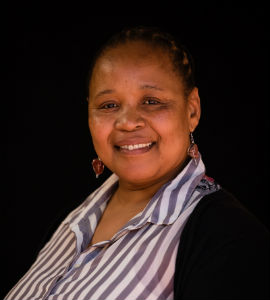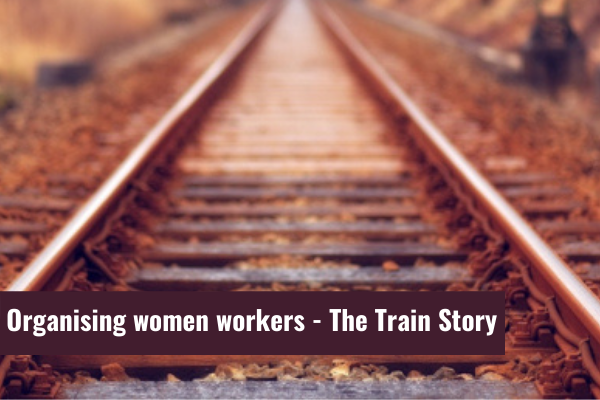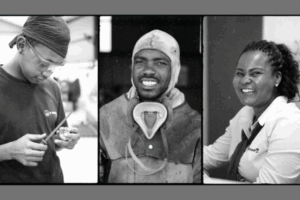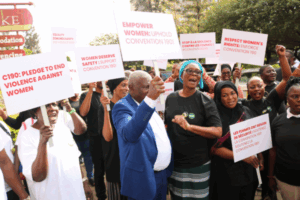Coach No. 4 in the early morning train from Sebokeng to Johannesburg is a coach with a difference. In many of the train’s other coaches, commuters speak about the spiritual issues one needs to address to get through the working day. But in Coach No.4 people choose to engage in discussion, debate and plan forms of resistance to oppression at the workplace and in public spaces like the train. The discussion is women-led.
About 90 commuters, mostly middle-aged and older women, are crammed into Coach No. 4. They are passionate, vigilant and militant about their rights as workers and commuters. Discussions in the coach are organised. Every Friday the topic for the following week is decided upon and a rod is handed over to the person who’ll be responsible for ensuring the smooth running of the discussions. The rod is rotated weekly. The person responsible for the week’s discussions needs to ensure that presentations, engagements and questions are short and to the point. On Friday’s some of the commuters (often the men on the coach) take responsibility for finding information that’ll inform the following week’s discussions.
After my initial surprise at the level of organisation on the coach, I tried to make sure that in the next few weeks I regularly visited Coach No. 4 to observe, and where I could participate in the discussions. Once the commuters got used to my presence I had an opportunity to conduct informal interviews with some of the participating women. I wanted to understand why they are in Coach No. 4. Their responses varied, ranging from using the early morning train ride as an informal space to discuss union activities to discussing the conditions affecting commuters, and particularly women travelling in Metrorail trains.
Elizabeth Makhanya, Train CommuterI like this coach because I can discuss problems I encounter at work without fear or prejudice. I can get advice without feeling like a fool.
Vusi Babina – Train commuterI was drawn to this coach by the chanting and singing. As a young person, I loved their singing. When I came here I was not a union member. Listening to stories of how people have been helped by unions I decided to join one. However, I find this space more accessible than my union meetings.
Mama Vusi – Train commuterI came to the coach because I was accompanying my friend who was unfairly retrenched and didn't have a union. She was able to find help and she was reinstated
Rorisang Mokonoto – Train commuterI was drawn to this space because trains were always late and I faced the danger of being retrenched after receiving the final written warning. People in this coach always facilitate meetings between us and Metrorail.
The lateness of trains is also linked to safety issues. Many of the women leave home as early as 4.00 am and are exposed to the threat of theft, molestation and sexual violence. In the negotiations with Metrorail, the women have requested Metrorail to coordinate a group of community youth to act as guards near all train stations, from 4.00 am to 10.00 pm every day. Most of the women I interviewed felt that what makes women come back to this space is the knowledge they share and how their problems are handled and addressed.
Bella Ngonyolo – Train commuterI like the coach because we need to ensure as workers that the struggle continues. We don't have to be complacent about our victories. As a young woman, I was groomed and mentored by this coach to become the strong woman that I am today. I wasn't a member of the union and had problems at work. They gave me support and coached me as I represented myself at the CCMA. They referred me to the department of labour, which intervened on my behalf at the CCMA. I am grateful for knowing about this coach
Like in many other spaces in the union, workplace and community where women are leading discussions, instrumental in facilitating the dialogue in the space, the women who’re the majority in the coach don’t see themselves as leaders. There is often a deferring to a group of men who are seen as more “knowledgeable” about labour issues because they are shop stewards. I guess that many of the women have as much or even more knowledge about organising and workplace issues. This could mean that the women don’t always recognise the invaluable and leading role they play in keeping alive the discussions in Coach No.4.
An important observation from one of the women participating in the discussions is that in this space the issues they raise are seen as important and not as just complaints. Some women also raise what they see as the contradiction between having a “voice” on the train and not having the same “voice at home. It’s interesting that at one level there is a valuing of the “voice” on the train while at the same time a devaluing of the same “voice” in relation to the male shop stewards in the Coach. The men, in turn, recognise their power and while claiming to embrace women leadership urge the women not to go back home and disrespect their husbands: “Being a leader doesn’t mean you have to start dictating terms to your husband. You need to respect your husbands”.
When I introduced myself and what I do, one of the men asked me to teach other women to respect their husbands. While I didn’t experience any direct confrontation with perceived gender roles, I am not sure if the silence on the part of women when confronted with the “respect your husband” was an acceptance of the prescribed gender roles or a tacit acceptance that the time was not yet right. It’s interesting though to note that the men who are in the Coach seem to have an appreciation of the role that the women play in the discussions and one can see that they are both listening attentively as well as participating respectfully. Some of the men indicated that they participated because they benefitted from the discussions and the honest way women ask questions, questions they as men would be too embarrassed to ask.
Coach No. 4 is not unique. I have encountered eight other trains in which similar spaces exist – trains from Vereeniging, Pretoria and Springs. Like Coach No. 4, these coaches are playing an important role in the Commuters Forum that’s been formed and is keeping Metrorail accountable to its passengers. Spaces like Coach No. 4 are important spaces for union organising and mobilising, but also importantly, spaces where shifts can be made in gender consciousness and practices. Already you have women who are leading but who need to value their knowledge, skills and relationship building qualities. Some men are practically respecting and acknowledging the role of women as leaders but who need to be challenged in their attempt at using gender roles to hold onto power.







